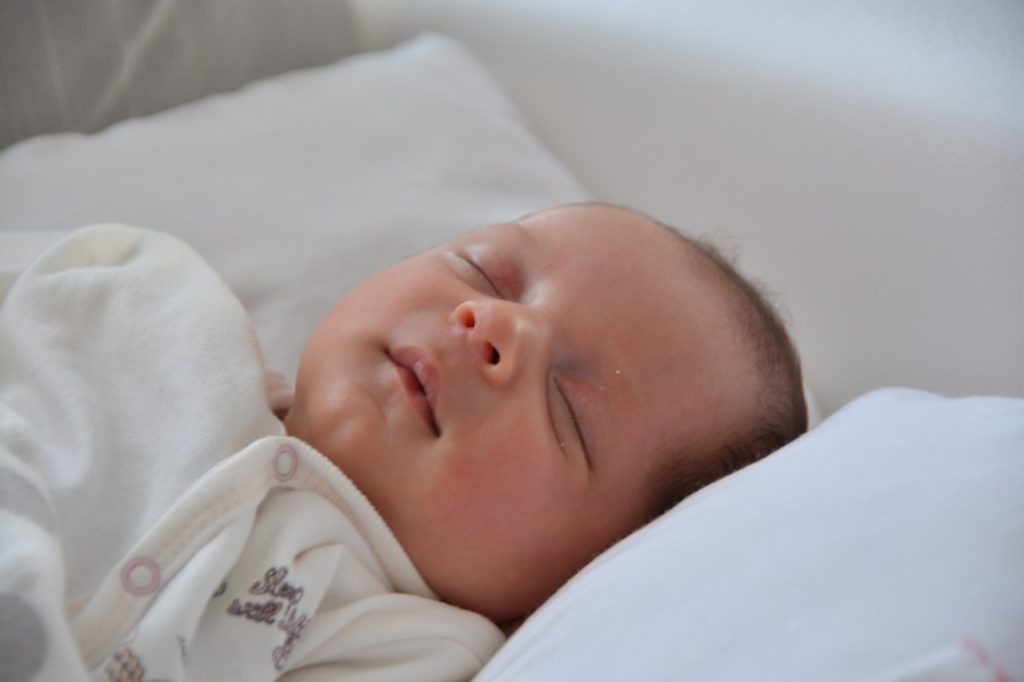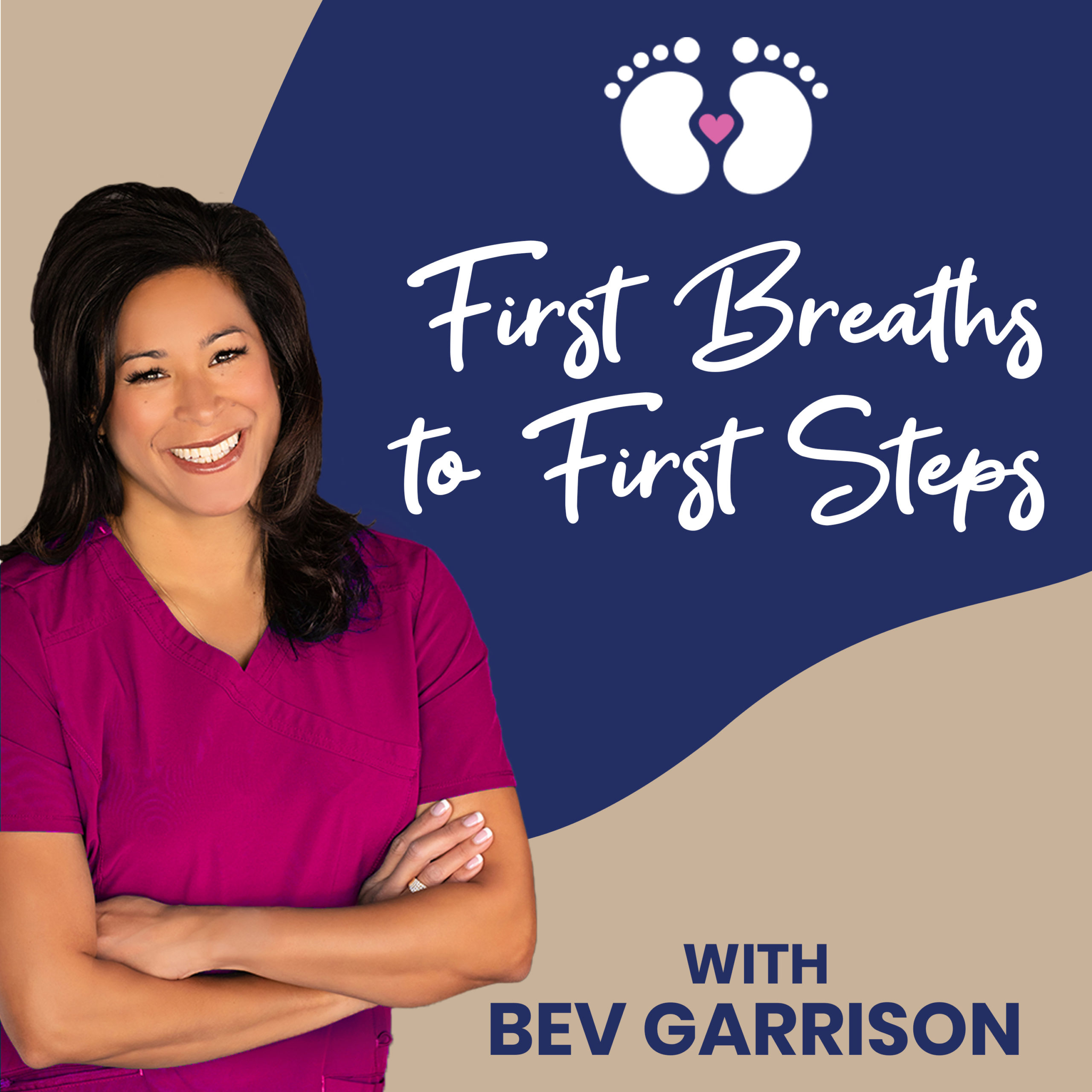What is the best environment to promote good sleep habits? How cold should our house be? These questions and more helping you to determine best sleep environment for your baby

Episode Transcript
Welcome to a podcast developed to coach new parents and families from first breaths to first steps. My name is Beverly Garrison and I’m a pediatric physician assistant with 20 years of general urgent and emergent pediatric experience. This is a new project for me, where I’ll be discussing new parent topics to address common at home questions for new families and parents.
For first-time listeners. I am the mother to three sons. I’ve trained and work in the Denver community. And I’m passionate about empowering new families with coaching and education. This podcast information and advice is not designed to diagnose, specify a treatment plan or take the place where advice and guidance from your primary care provider. If questions should arise about content of this podcast, please contact your PCP for further evaluation and discussion. Remember opinions offered here are not to substitute well or acute medical care.
So let’s talk about good sleep habits today. I’d like to cover just some brief points about where our baby should be sleeping, how long they should be sleeping for and what is a good and safe environment for them to be sleeping. I’d like to end up with a few tips and tricks that I think for good sleepers, I do always like to start off when I’m talking to parents about sleep and let them know that good sleepers are made, they are not born.
Babies are super flexible, so you have to be ready to commit the time and energy, to get them in a good habit that works for your particular schedule, your lifestyle, work, family, But it does take time, it’s effort well spent early on. Probably one of the most burning questions that most newborn parents want to know is what is my baby going to sleep through the night?
This is obviously an individual answer for each family and each baby. Every baby is different and there’s no way to predict when is one baby gonna sleep to the night versus another. But I do think that it is well worth your time and energy to focus on this part of your newborn experience. If you take that time to really commit to what works well for you and your lifestyle. You’ll have a good sleeper fairly quickly.
So let’s start off with where should our babies be sleeping? It’s definitely recommended that our newborns are sleeping either in a crib or bassinet, some sort of sleeping environment that is designated and specified for newborns. You want to make sure that sheets and linens are well-fitted, there’s no bumpers or anything loose inside the crib. No stuffed animals. No loose blankets. Biggest reason for that is that you want to make sure that there’s nothing that could potentially get in front of the face of your baby and, or wrap around their head.
The American Academy of pediatrics recommends that the first six months to 12 months, that newborns are sleeping in their parents’ room. I think that this is probably a good idea based on the fact that if you’ve never had a newborn before. You don’t know what to expect, and sometimes it can just be easier and more convenient for feeding and for parents to get to their baby easily.
It’s definitely not safe or recommended for any type of co-sleeping. Whether that be in parents’ beds, in an armchair, even sitting up with the child on a couch or. rocker just not recommended. This is fatigue, like you’ve never experienced in your entire life. And so the last thing that you want to have happen is for you to fall asleep on top of the baby, roll over the baby.
Anything that might cause any sort of suffocation. Parents’ beds and regular bedding is not SIDS approved. It’s not meant, for newborns to be sleeping on and you really, really want to make sure that you’re following this guideline. There are definitely some products out there that. are meant to be devices that hold baby in place while on an adult bed, there just isn’t really enough information on how safe these products are. But it’s definitely clear that it’s recommended that all newborns are in beds that are approved for babies.
Next let’s talk about how long newborns should be sleeping. Realize when you first get your baby home, they may sleep a majority of the day 20 plus hours in a 24 hour period, which seems just crazy, but no reason to be alarmed.
This is definitely normal. You may feed, keep your baby awake for 10, 15 minutes. And then, and then right back to sleep, I think the biggest thing is that you want to identify what is daytime and what is nighttime. So during the day I encourage parents to keep it lively talk, sing, coo, read to your baby. Lots of energy. At night time, if you can feed by nightlight, burp, settle and put right back, this is best. What you’re trying to do is identify daytime and nighttime so that kids don’t get that mixed up. And that in the evening, everybody is sleeping and during the day, baby is awake with you as a family. As newborn babies are getting older, they will have longer wake times, but initially remember they are just not awake very long. Providers will say that if babies have regained their birth weight, it’s okay to let them have one long stent at night.
Lastly, let’s identify what type of environment. Is best for your newborns to be sleeping in. The American Academy of pediatrics recommends that babies are sleeping in parents’ room for the first six to 12 months. I’m not sure that there’s a concrete answer for six or 12 months. I think the more comfort you have in having your baby sleep in the nursery, versus sleeping in a room is definitely an individual choice, but I think you definitely want to gain that confidence early on when newborns are sleeping in your room.
A lot of times new parents ask about how cold should the room be? How warm should the room be? We usually recommend that you keep the environment comfortable for you, but maybe dress your baby in one more layer. There’s no hard and fast rule as far as what should the thermostat be set at. But a lot of times, Providers will recommend that you keep it comfortable for what you guys usually are operating in and then just add one more layer for your baby.
Lastly, for good sleep environments, I usually do recommend. Some type of white noise, either running a humidifier, in Denver it’s so dry, so it kind of serves two purposes helps to kind of get a little more humidity in the air, but it definitely gives some good background noise or even a noise machine. I think this gets our babies used to a non-sterile environment. So that during the day when the doorbell rings or the dog is barking, or siblings are talking and screaming that babies are used to that, and they’re able to sleep through it.
So let’s finish up with some tips and tricks that I think are helpful for good sleep hygiene. The first tip I’d like to offer is during the day, move your baby around in the places that they sleep, I would try sleeping in them, in their crib, let them sleep in the bassinet, let them sleep in a pack and play. I think this makes for flexible babies. When you move your baby around and they get used to sleeping in different environments, and when it’s time to travel and be out and about, you have the confidence that your baby will have the ability to sleep anywhere.
Second tip that I’d like to offer is don’t try to remove all noise and make it sterile during the day. Life happens. We do not live in a Ziploc bag. So you want to make sure that you get your baby accustomed to noise and that they’re able to sleep through that.
Lastly, I think with sleeping. We all have concerns about the risk for SIDS or sudden infant death syndrome. There’s not a ton in the literature that significantly identifies what the risks are, but we definitely know that back sleeping significantly reduces this risk. So you want to make sure that you really commit to that just to keep your baby as safe as possible. Once babies are rolling, . They no longer need to be sleeping on their back, but that’s definitely assigned to us that if they can roll that they’re able to kind of move their head and clear their airway, but also that you want to have everything loose out of the crib.
So in summary, where maybe should. Definitely approved bedding, bassinet, crib, no co-sleeping. And as far as how long, realize that early on, they’re going to sleep a lot. There’s not a specific time, but you may even see some infants sleep all the way up to 20 plus hours a day. I would say, remember to encourage quiet low key environment at night. And during the day, don’t be afraid of noise talking, singing cooing to your baby to encourage that they know daytime and nighttime. Lastly, good sleep environment. First six months to 12 months in parents’ room. Definitely think about adding one more layer, as far as clothing and consider having some sort of white noise to help them settle.
Hope this is helpful. And we’ll talk with you next time.


